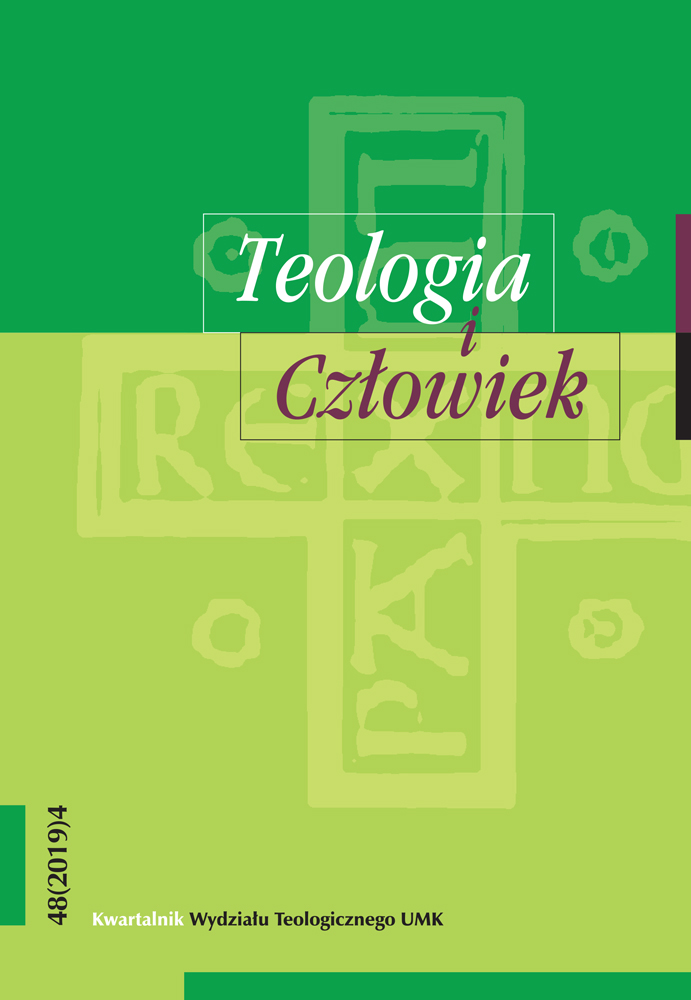Preaching the Word of God in the Context of Popular Piety
DOI:
https://doi.org/10.12775/TiCz.2019.042Keywords
Preaching, Word of God, Popular PietyAbstract
This article first discusses the relation of popular piety to the liturgy, stressing the differences between them and the fact that there is no competition between them, but rather there is desirable complementarity: popular piety services on one side prepare for the liturgy, and on the other they help to deepen the experience of the latter one. The specifics of the preaching the word of God in the context of popular piety determines the distinction, at least in the Polish language and practice, between “the sermon” and “the homily”. The first one describes preaching in the context of popular piety, whereas the second term “the homily” is reserved for the preaching during the liturgy. The specifics of the sermon is influenced by the non-liturgical context of preaching, as well as the extended group of people that might preach, as well as the language that can be less restricted than the language of the homily.
References
Źródła
Benedykt XVI, Adhortacja apostolska Verbum Domini (30.09.2010), AAS 102 (2010), s. 681-787.
Franciszek, Evangelii gaudium (24.11.2013), AAS (2013), s. 1019-1137.
Katechizm Kościoła Katolickiego, Poznań 1994.
Kodeks prawa kanonicznego, Poznań 1983.
Konferencji Episkopatu Polski. Komisja ds. Kultu Bożego i Dyscypliny Sakramentów, Wskazania Konferencji Episkopatu Polski dotyczące homilii mszalnej (21.11.2017), http://episkopat.pl/biskupi-homilie-powinny-byc-kazdorazowo-starannie-przygotowywane/ (aktualizacja: 17.02.2018).
Kongregacja ds. Duchowieństwa, Papieska Rada ds. Świeckich, Kongregacja Nauki Wiary, Kongregacja ds. Kultu Bożego i Dyscypliny Sakramentów, Kongregacja ds. Biskupów, Kongregacja ds. Ewangelizacji Narodów, Kongregacja ds. Instytutów Życia Konsekrowanego i Stowarzyszeń Życia Apostolskiego, Papieska Rada ds. Interpretacji Tekstów Prawnych, Instrukcja o niektórych aspektach dotyczących współpracy wiernych świeckich w ministerialne posłudze kapłanów, „Ecclesiae de mysterio” (15.08.1997), AAS 89 (1997), s. 852-877, tekst polski, „L’Osservatore Romano”, wyd. pol., 12 (1998), s. 30-40.
Kongregacja ds. Kultu Bożego i Dyscypliny Sakramentów, Dyrektorium o pobożności ludowej i liturgii, Zasady i wskazania (17.12.2001), Poznań 2003.
Kongregacja Kultu Bożego i Dyscypliny Sakramentów, Piąta instrukcja „dla poprawnego wprowadzenia konstytucji Soboru Watykańskiego Drugiego o liturgii świętej” (art. 36). Stosowanie języków narodowych przy wydawaniu ksiąg rzymskiej liturgii. Liturgiam authenticam (28.03.2001), „Notitiae” 37 (2001), s. 120-174.
Paweł VI, Adhortacja apostolska Evangelii nuntiandi (8.12.1975), AAS 68 (1976), s. 5-76.
Sobór Watykański II, Konstytucja dogmatyczna o Objawieniu Bożym, Dei Verbum (18.11.1965).
Sobór Watykański II, Konstytucja dogmatyczna o Objawieniu Bożym, Dei Verbum (18.11.1965).
Sobór Watykański II, Konstytucja o liturgii świętej, Sacrosanctum Concilium (4.12.1963).
V Conferencia General del Episcopado Latinoamericano y del Caribe, Documento de Aparecida (13-31.05.2007), Aparecida 2007.
Literatura przedmiotu
Arens H. Die Predigt als Lernprozess, München 1972.
Cichy S., Pobożność ludowa, http://analizy.biz/apologetyka/index.php-option=com_content&task=view&id=845&Itemid=50.htm (aktualizacja: 17.02.2018).
Brzeziński D., Sakramentalność słowa Bożego w świetle adhortacji apostolskiej Benedykta XVI, Verbum Domini, „Liturgia Sacra” 17 (2011), nr 1, s. 15–23.
Franciszek, Do bractw kościelnych o pobożności ludowej, http://www.opoka.org.pl/aktualnosci/news.php?id=47639&s=opoka, Watykan, 05.05.2013 (aktualizacja: 17.02.2018).
Misiaszek K., Charakter języka katechezy, w: Język katechezy, red. R. Przy¬bylska, W. Przyczyna, Tarnów 2008, s. 52-69.
Nadolski B., Leksykon liturgii, Pallottinum, Poznań 2006.
Nadolski B., Pobożność ludowa a liturgia, „Communio” 7 (1987) 6, s. 91-106.
O’Collins G., Farrugia E.G., Leksykon pojęć teologicznych i kościelnych z indeksem angielsko - polskim, Wydawnictwo WAM, Kraków 2002.
Przybyłowski J., Duszpasterskie wyzwania Dyrektorium o pobożności ludowej i liturgii, „Seminare” 20 (2004), s. 145-162.
Sławiński H., O możliwości i konieczności mówienia o Niewyrażalnym, „Studia Włocławskie”, t. 19 (2017), s. 319-332.
Sławiński H., Problem języka w nauczaniu religii wśród młodzieży, „Ateneum Kapłańskie” 626 (2013), z. 1, t. 161, s. 109-128.
Sławiński H., Troska Kościoła o poprawę jakości homilii: od synodu o Eucharystii i Sacramentum Caritatis do synodu o słowie Bożym i Verbum Domini, „Colloquia Theologica Ottoniana” 2012, nr 1, s. 37-62.
Sławiński H., Wkład papieża Franciszka w język nowej ewangelizacji, w: Nowa ewangelizacja. Język - teologia - kultura, red. M. Nowak, W Przyczyna (Teolingwistyka 13), Tarnów 2017, s. 231-255.
Taras P., Religijność ludowa w Kościele katolickim, „Communio” 7 (1987) 6, s. 14-19.
Twardy J., Aktualizacja słowa Bożego w kaznodziejstwie, Przemyśl 2009
Watykan: nowy dokument o pobożności ludowej (9.04.2002), https://ekai.pl/watykan-nowy-dokument-o-poboznosci-ludowej/ (aktualizacja: 17.02.2018).
Downloads
Published
How to Cite
Issue
Section
License
CC BY ND 4.0. The Creator/Contributor is the Licensor, who grants the Licensee a non-exclusive license to use the Work on the fields indicated in the License Agreement.
- The Licensor grants the Licensee a non-exclusive license to use the Work/related rights item specified in § 1 within the following fields: a) recording of Work/related rights item; b) reproduction (multiplication) of Work/related rights item in print and digital technology (e-book, audiobook); c) placing the copies of the multiplied Work/related rights item on the market; d) entering the Work/related rights item to computer memory; e) distribution of the work in electronic version in the open access form on the basis of Creative Commons license (CC BY-ND 3.0) via the digital platform of the Nicolaus Copernicus University Press and file repository of the Nicolaus Copernicus University.
- Usage of the recorded Work by the Licensee within the above fields is not restricted by time, numbers or territory.
- The Licensor grants the license for the Work/related rights item to the Licensee free of charge and for an unspecified period of time.
FULL TEXT License Agreement
Stats
Number of views and downloads: 737
Number of citations: 0



